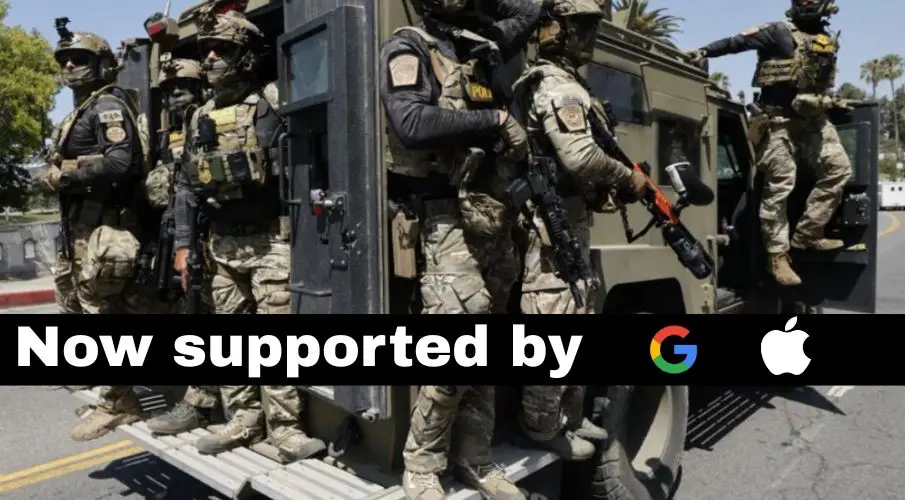Apple and Google have sent a clear signal this week - and in doing so banned far more than just an app from their stores. Both companies blocked applications that allowed people to report sightings of ICE agents in the U.S. and thus receive early warnings about raids. Officially, this happened under pressure from the Trump administration. Unofficially, however, it marks a break with the principles once invoked by the tech industry: openness, innovation and the protection of free communication.
At the center is the app ICEBlock, which has gained more than one million users since April. It functioned similarly to navigation services where drivers report police checkpoints or speed traps. In this case, people could use a crowdsourcing function to mark ICE presence nearby. For many migrant families it was a lifeline, a tool to preserve a piece of safety in everyday life. But when U.S. Attorney General Pam Bondi publicly pressured Apple and called ICEBlock a danger to federal agents, the company reacted within hours. Google also followed suit and removed similar apps.
The government’s argument: such tools endangered the safety of ICE employees and could contribute to violence - a claim that carried weight particularly after the shooting attack on an ICE facility in Dallas. Yet evidence that the apps were used in this case has to this day not been presented. Developer Joshua Aaron rejected the accusation. “You don’t need an app to know that ICE is at an ICE detention facility,” he said. For him, Apple’s actions were nothing less than caving in to an authoritarian regime.
Immigration lawyers and civil rights groups share this assessment. Kica Matos of the National Immigration Law Center called it a “disturbing example of how tech companies are capitulating to the Trump administration.” Harvard attorney Alejandra Caraballo warned of a dangerous precedent: if the government can dictate which apps are allowed in stores, the path to targeted information control is laid. She drew parallels to China, where in 2019 Apple removed an app under pressure from Beijing that Hong Kong protesters had used to track police movements.
While ICE and the Justice Department argue it is about protecting officers, activists see a deliberate censorship that disenfranchises communities. Platforms like StopICE.Net, which document ICE activities not through apps but via text messages or online maps, are already reporting government pushback. Meta received a subpoena from the Department of Homeland Security demanding data on the group’s accounts - a process that is currently legally blocked. For founder Sherman Austin, the situation is clear: “We are facing a government that wants to control any information it deems dangerous.”
For journalists this development is another alarm signal. Anyone reporting on ICE and the escalation of raids must assume that the government is targeting not only migrant communities but also the press itself. Apps that document what ICE does in the shadows are not just tools for those affected, but also valuable sources for reporting. If they are removed, the risk increases that reporters in the field will enter dangerous situations unprepared - and that ICE will act unseen.
This raises a fundamental question: what remains of the tech giants’ promises to be spaces for free innovation and independent communication? In reality, their principles now appear purchasable - by political threats, by market interests, perhaps even by fear of being targeted from Washington. What remains is a bitter impression: even conscience has become purchasable. And that is where the true danger lies - for migrants, for communities, for journalists and for every form of free society.
Investigative journalism requires courage, conviction – and your support.
Please also strengthen our journalistic fight against right-wing populism and human rights violations. We do not want to finance ourselves through a paywall so that everyone can read our research – regardless of income or origin. Thank you very much!


Tech-Giganten waren immer schon nur auf Gewinn aus.
Gewissen war leider auch schon immer käuflich, es ist nur eine Frage des Preises.
Die Verbannung dieser App, innerhalb kurzer Zeit, zeigt deutlich, dass die USA keine Demokratie mehr sind.
Die Tech Giganten wollen nicht ins Visier beraten und möglichst lange „unentbehrlich“ sein und möglichst lange ein Stück vom Kuchen abbekommen.
Sie vergessen, dass es die User waren und sind, die sie groß gemacht haben.
Nun geben sie den Menschen einen Yritt. Wohlwissend, dass ein Boykott ihrer Produkte nicht im großen Stil möglich ist.
Es wird Zeit, dass Europa sich ein eigenes Netz an Anwendungen erarbeitet.
…na da werden einige kollektive nun aber den startknopf drücken,,,